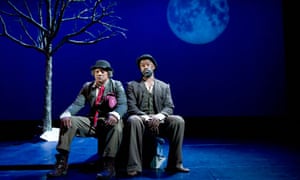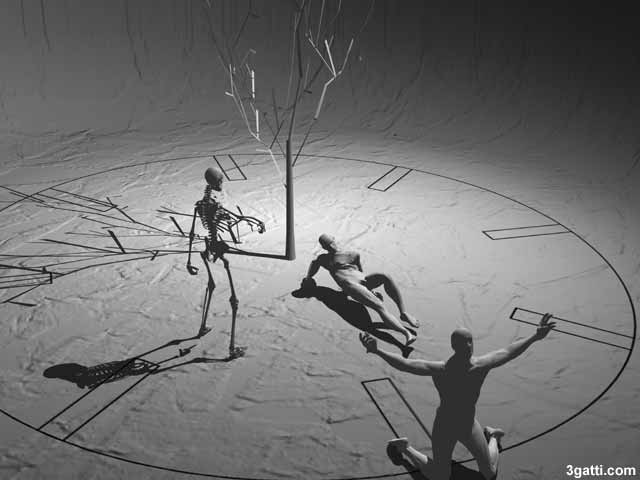
Source
When we were discussing existentialism in class, I immediately thought of the play Waiting for Godot by Samuel Beckett. We read this play in high school because it was a play designed to discuss and show the value of existentialism. However, before we can think about existentialism and Waiting for Godot we must give some explanation on both.
Existentialism is a philosophical theory or approach that emphasizes the existence of the individual person as a free and responsible agent determining their own development through acts of the will. Basically, existentialism is the belief that individuals must give meaning to their own life.
The main characters of Waiting for Godot, Vladimir and Estragon, spend the entire play by a tree and walk waiting for Godot who is either a man or deity depending on your interpretation. They don't know if they've already met Godot, they don't know what he looks like, they don't know if they are in the right location and they don't know if it is the right day to meet him. Quite literally, they don't know anything and neither does the audience. They spend the entire play waiting for someone who may not ever show up. If you want to know more, Shmoop has a good summary as always.

Source
The most common interpretation of the play is the Vladimir and Estragon are waiting for God to show up and meet them. Whether or not they are in purgatory or represent the normal man who waits for God to give his life meaning is up to debate. This play is a visual representation of existentialism.
Although Vladimir and Estragon spend time walking around the stage/tree they do not actually go anywhere. They talk about leaving, but they never leave because if they leave Godot won't find them. They aren't sure that Godot will come anyways, but if they leave then they definitely won't meet him.
Time is also meaningless in the play. There is no concept of time or the passing of time. Pozzo's (a secondary character) watch is broken so even thought he checks it he cannot tell what time it is. The characters are literally wasting away waiting for Godot who may never come.
The underlying idea of the play is that you cannot wait for God to do something in your life. If you do you will waste away. You have to make your own meaning in life, otherwise it is meaningless.
Source

Caitlin,
ReplyDeleteAlthough I've never actually read the play, I am quite intrigued by the concept. It is interesting how they wait and wait each day for Godot who they know nothing about. They have basically let go of any sort of human freedom and allowed themselves to become meaningless as they expect a some sort of God to give them purpose. They sort of resemble the waiter in the cafe, seemingly stuck from making a choice because they are waiting on God.
Although I have also never read or seen the play, I think your analysis shows clear links to the existentialism of it. As Theresa said, Vladimir and Estragon seem to have abandoned their freedom under the pretense that doing so will bring God to them. I would be interested to read the play (though their unwillingness to act would probably infuriate me) to see if Vladimir and Estragon ever do anything with their lives, and to further witness the underlying existentialist themes.
ReplyDeleteLike Theresa and Ali, I have never read or seen the play; however, I find it so interesting the parallels between existentialism and Waiting for Godot. Humans are kind of like Wladimir and Estragon just waiting and waiting on God or another higher power to intervene into our lives and show us what to do. Also, as humans we wait around for other people all the time, but if we continue to do this, like you said, our lives will become meaningless and essentially nothing because we have lost the idea of "living".
ReplyDeleteIt sounds like a really interesting play. I personally think that this two characters, Vladimir and Estragon decided to be objects. They decided to not be humans because they lived their life in accordance with something or someone else, Godot. We as humans have freedom to decide or to do wathever we want. They literally say: "let's wait in here until 'Godot' comes. Let's be objects; let's do nothing." I can't say that they were avoiding a decision because they decided to stay, but what I can say is that they didn't want to act without being afraid.
ReplyDeleteCaitlin,
ReplyDeleteThis play sounds like a brilliant take on existentialism, in that the main characters would do well to take a class on the theory. What I think is really fascinating about the play is how it demonstrates the ways in which existentialism and religion can butt heads. Had this play been a parable from the Bible (or I dare say any holy book) Godot would have eventually arrived, and when he did the two waiting gentlemen would have been justly rewarded. A similar tale of events can be seen in the biblical story in which God told Abraham and Sara to wait a year for him. After that year he blessed the elderly couple with a child.
Caitlin,
ReplyDeleteI think this play is a perfect example! I have never read it either, but the parallels to existentialism are obvious. Efren made a really good point: Vladimir and Estragon did decide to become objects. It seems like they completely gave up responsibility for their own lives and their agency by making Godot the central focus so they wouldn't have to do anything else. The major point of existentialism is that you have to take responsibility for your own freedom and shape the live you want to have. In the play the characters are doing the extreme opposite of course by literally doing nothing but waiting by a tree. Though, as Jennifer pointed out we as humans do wait on other people or events to happen all the time in our own lives. I think the play provides as good hyperbolic example of the road we could go down if we never decide to be the doer in own own lives.
Caitlin,
ReplyDeleteI also agree with my fellow classmates and think that this play seems like a perfect example of existentialism. Another play that parallels the way existentialism is presented in this play is "Rosencrantz and Guildenstern Are Dead." You should check it out. They way that the main characters of that play exemplify this concept is that they are basically being controlled by fate, without it, they would not exist. I feel like both of these plays illustrate this very well. I find it very interesting how you related existentialism to "Waiting for Godot."
This was a really interesting and engaging post and a great overview. Caitlyn did a great job.
ReplyDelete